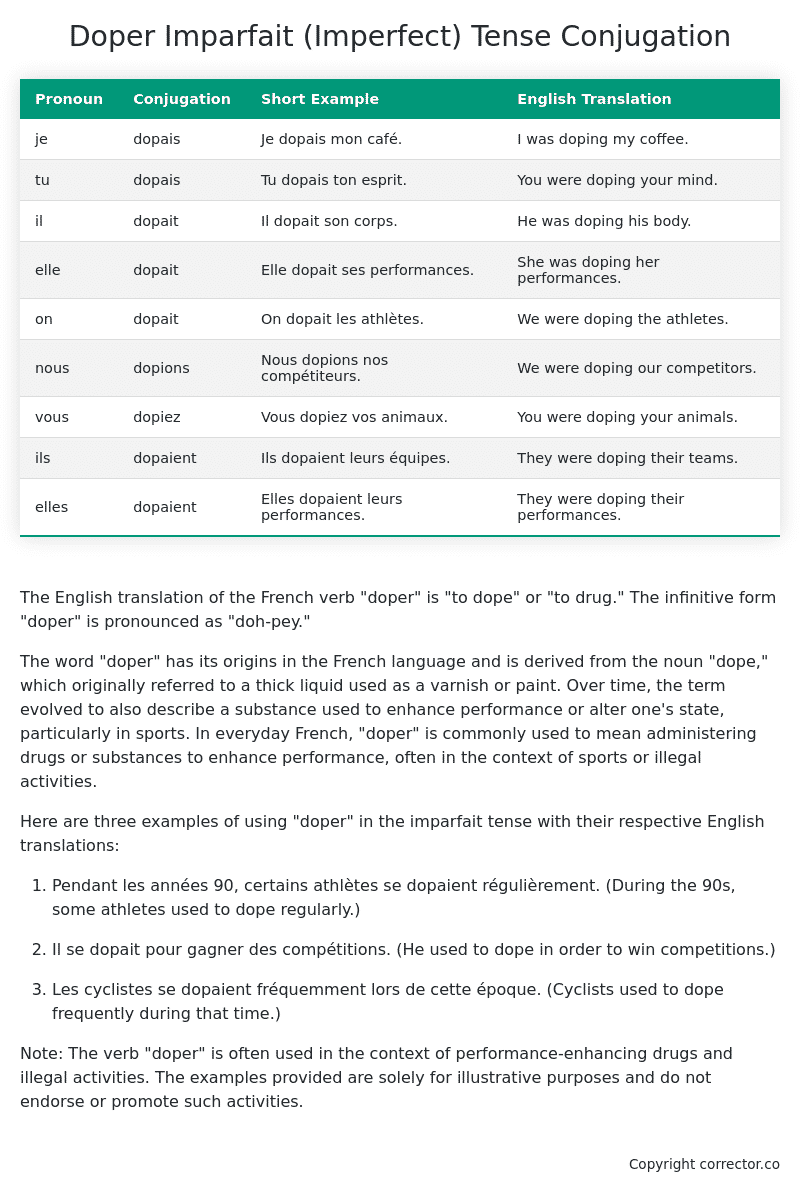Imparfait (Imperfect) Tense Conjugation of the French Verb doper
Introduction to the verb doper
The English translation of the French verb “doper” is “to dope” or “to drug.” The infinitive form “doper” is pronounced as “doh-pey.”
The word “doper” has its origins in the French language and is derived from the noun “dope,” which originally referred to a thick liquid used as a varnish or paint. Over time, the term evolved to also describe a substance used to enhance performance or alter one’s state, particularly in sports. In everyday French, “doper” is commonly used to mean administering drugs or substances to enhance performance, often in the context of sports or illegal activities.
Here are three examples of using “doper” in the imparfait tense with their respective English translations:
-
Pendant les années 90, certains athlètes se dopaient régulièrement.
(During the 90s, some athletes used to dope regularly.) -
Il se dopait pour gagner des compétitions.
(He used to dope in order to win competitions.) -
Les cyclistes se dopaient fréquemment lors de cette époque.
(Cyclists used to dope frequently during that time.)
Note: The verb “doper” is often used in the context of performance-enhancing drugs and illegal activities. The examples provided are solely for illustrative purposes and do not endorse or promote such activities.
Table of the Imparfait (Imperfect) Tense Conjugation of doper
| Pronoun | Conjugation | Short Example | English Translation |
|---|---|---|---|
| je | dopais | Je dopais mon café. | I was doping my coffee. |
| tu | dopais | Tu dopais ton esprit. | You were doping your mind. |
| il | dopait | Il dopait son corps. | He was doping his body. |
| elle | dopait | Elle dopait ses performances. | She was doping her performances. |
| on | dopait | On dopait les athlètes. | We were doping the athletes. |
| nous | dopions | Nous dopions nos compétiteurs. | We were doping our competitors. |
| vous | dopiez | Vous dopiez vos animaux. | You were doping your animals. |
| ils | dopaient | Ils dopaient leurs équipes. | They were doping their teams. |
| elles | dopaient | Elles dopaient leurs performances. | They were doping their performances. |
Other Conjugations for Doper.
Le Present (Present Tense) Conjugation of the French Verb doper
Imparfait (Imperfect) Tense Conjugation of the French Verb doper (You’re reading it right now!)
Passé Simple (Simple Past) Tense Conjugation of the French Verb doper
Passé Composé (Present Perfect) Tense Conjugation of the French Verb doper
Futur Simple (Simple Future) Tense Conjugation of the French Verb doper
Futur Proche (Near Future) Tense Conjugation of the French Verb doper
Plus-que-parfait (Pluperfect) Tense Conjugation of the French Verb doper
Passé Antérieur (Past Anterior) Tense Conjugation of the French Verb doper
Futur Antérieur (Future Anterior) Tense Conjugation of the French Verb doper
Subjonctif Présent (Subjunctive Present) Tense Conjugation of the French Verb doper
Subjonctif Passé (Subjunctive Past) Tense Conjugation of the French Verb doper
Subjonctif Imparfait (Subjunctive Imperfect) Tense Conjugation of the French Verb doper
Subjonctif Plus-que-parfait (Subjunctive Pluperfect) Tense Conjugation of the French Verb doper
Conditionnel Présent (Conditional Present) Tense Conjugation of the French Verb doper
Conditionnel Passé (Conditional Past) Tense Conjugation of the French Verb doper
Conditionnel Passé II (Conditional Past II) Tense Conjugation of the French Verb doper
L’impératif Présent (Imperative Present) Tense Conjugation of the French Verb doper
L’impératif Passé (Imperative Past) Tense Conjugation of the French Verb doper
L’infinitif Présent (Infinitive Present) Tense Conjugation of the French Verb doper
L’infinitif Passé (Infinitive Past) Tense Conjugation of the French Verb doper
Le Participe Présent (Present Participle) Tense Conjugation of the French Verb doper
Le Participe Passé (Past Participle) Tense Conjugation of the French Verb doper
Struggling with French verbs or the language in general? Why not use our free French Grammar Checker – no registration required!
Get a FREE Download Study Sheet of this Conjugation 🔥
Simply right click the image below, click “save image” and get your free reference for the doper imparfait tense conjugation!

Doper – About the French Imparfait Tense
NOTE: To take a deep dive into all the French tenses then see our article on Mastering French Tense Conjugation.
Formation of the Imparfait Tense
For regular -er verbs:
For regular -ir verbs
For regular -re verbs
Common Everyday Usage Patterns
Description of Past Habits
Background Information
Mental and Emotional States
It’s employed to express emotions, thoughts, or physical sensations in the past. For example: “J’étais content quand il est arrivé.” (I was happy when he arrived.)
Ongoing Actions
Points to Note About the Imparfait Tense
Passé Composé vs. Imparfait
Conditional
Si Clauses
Narration
I hope you enjoyed this article on the verb doper. Still in a learning mood? Check out another TOTALLY random French verb imparfait conjugation!


